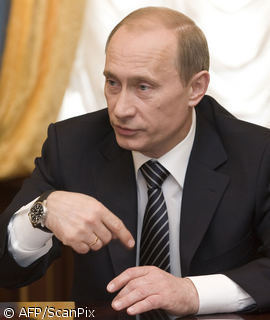Hungary will probably postpone euro adoption from 2008 to 2010 because of high inflation and budget deficits
Published:
26 February 2004 y., Thursday
Hungary will probably postpone euro adoption from 2008 to 2010 because of high inflation and budget deficits, Finance Minister Tibor Draskovics said. The National Bank of Hungary (MNB) has argued for faster adoption, saying it will boost growth.
Draskovics detailed some proposed cuts in state expenditure. Plans include reducing the number of higher civil servants, such as government advisors and state secretaries; the number of state-run foundations; and support for ethnic Hungarians abroad.
January inflation was higher than the Finance Ministry expected, at 6.6% yr/yr and 2.1% month-on-month. It expects annual inflation in 2004 to be near the higher end of its 6%–6.5% target band.
The February budget deficit is anticipated to be about Ft 180 billion (Ђ684 million), boosted by interest payments, Finance Ministry sources said. The estimated February gap would push the two-month figure to Ft 399 billion, or 43% of the full-year target.
Industrial output grew 6.4% in 2003, after a 2.8% increase in 2002, the Central Statistics Office (KSH) said. In December output fell 0.8% month-on-month.
Real wages rose by 9.2% in 2003, as the result of a 14.3% rise in average net wages and twelve-month consumer price inflation of 4.7%, the KSH announced.
The government wants to raise R&D spending to 1.8%–1.9% of GDP by 2006, and to 3% by 2010, Prime Minister Pйter Medgyessy said. Last year the figure was barely above 1%.
The number of operating businesses in Hungary rose 2.6%, to a total of 969,559 in 2003, including not-for-profit and budget-funded businesses, the KSH said.
Šaltinis:
bbj.hu
Copying, publishing, announcing any information from the News.lt portal without written permission of News.lt editorial office is prohibited.
The most popular articles
 Vladimir Putin appeared on live television and radio for his annual question-and answer session with the public.
more »
Vladimir Putin appeared on live television and radio for his annual question-and answer session with the public.
more »
 EUFISERV Payments announced today that the separation of the EUFISERV ATM Scheme from EUFISERV's former processing business is now complete, and is in line with the SEPA requirements of the European Central Bank and the European Commission.
more »
EUFISERV Payments announced today that the separation of the EUFISERV ATM Scheme from EUFISERV's former processing business is now complete, and is in line with the SEPA requirements of the European Central Bank and the European Commission.
more »
 600,000 Mexicans work in the auto and auto parts industries, and U.S. automakers run around a dozen plants.
more »
600,000 Mexicans work in the auto and auto parts industries, and U.S. automakers run around a dozen plants.
more »
 The President of the European Commission Jose Barroso says some British politicians are considering signing up to the euro
more »
The President of the European Commission Jose Barroso says some British politicians are considering signing up to the euro
more »
 It's official. The U.S. economy is in a recession.
more »
It's official. The U.S. economy is in a recession.
more »
 The crisis that started in the US over a year ago has sent shock waves around the globe.
more »
The crisis that started in the US over a year ago has sent shock waves around the globe.
more »
 Offering a coordinated response to the EU’s deepening economic crisis, the Commission is proposing €200bn in measures to boost purchasing power and generate growth and jobs.
more »
Offering a coordinated response to the EU’s deepening economic crisis, the Commission is proposing €200bn in measures to boost purchasing power and generate growth and jobs.
more »
 The two men charged with keeping Britain's economy afloat moved on Monday to ward off a deepening recession.
more »
The two men charged with keeping Britain's economy afloat moved on Monday to ward off a deepening recession.
more »
 European citizens are getting older and greyer. By 2050 it is estimated that the average age in the European Union will be 49, up from 39 now.
more »
European citizens are getting older and greyer. By 2050 it is estimated that the average age in the European Union will be 49, up from 39 now.
more »
 Addressing U.S citizens, Barack Obama spoke of plans to revive the economy.
more »
Addressing U.S citizens, Barack Obama spoke of plans to revive the economy.
more »